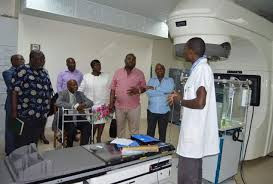
HARARE, Feb 13 (NewsDayLive) - The Parliamentary Portfolio Committee on Health has called for the decentralisation of cancer treatment facilities to district hospitals for better management of the disease.
Cancer has become the country's major killer disease, with cervical, breast and prostate cancers topping the list.
In a report released this week following a tour of the country's six major hospitals, the Parliamentary Portfolio Committee on Health noted that most public institutions have inadequate infrastructure, human and financial resources, hence the call to decentralise treatment of non-communicable diseases to district healthcare centres which are usually better resourced.
“There is need for the Ministry of Health and Child Care to formulate a policy to ensure that training schools retain some of the health personnel by June 2025; There is need for the Ministry of Health and Child Care to develop a roadmap for the decentralization of cancer treatment facilities to all district hospitals by June 2025. This includes procurement of mobile clinics and capacitation of primary health care facilities to provide these services,” the report read.
“The committee noted that at both Mpilo and Parirenyatwa Central hospitals, critical radiotherapy machines had been non-functional since 2021. At Parirenyatwa, one of the two brachytherapy machines was down due to the exhaustion of Cobalt 60 radioactive sources, needing to be replenished," the reportnoted.
"Additionally, the linear accelerators, essential for targeted cancer treatments, had been non-functional for the past two years, severely impacting the hospital’s ability to provide comprehensive cancer care. At Mpilo Central Hospital, the situation was similarly dire, with only 7 out of 14 renal treatment machines operational, reducing the hospital’s capacity to provide necessary dialysis treatments,” part of the report read.
The committee also noted that the mammogram machine at Mpilo, which was donated by the National AIDS Council (NAC) for breast cancer screening, was out of service, thereby halting vital early detection processes for breast cancer, a major concern given the high prevalence of late-stage cancer diagnoses.
“Further to that, the mobile X-ray unit at Mpilo was also down, causing significant delays in surgical procedures for children, who require timely diagnostic imaging for accurate and effective treatment. More so, although the laboratory services were fairly equipped with essential diagnostic tools, they suffered from an erratic supply and availability of key reagents.”
- Out & about: Knives out for polycystic ovary syndrome
- Outcry over rude Byo council clinic staff
- Nurse shortage hits Byo
- Murewa South snubs fly-by-night politician
Keep Reading
“This inconsistency disrupted routine diagnostic testing and delayed critical medical investigations, undermining the overall efficiency of the hospital's healthcare delivery system. Consequently, the combination of outdated and malfunctioning equipment, coupled with supply chain issues, paints a challenging picture for the hospitals’ ability to deliver timely and effective patient care."
The committee recommended that the Ministry of Health and Child Care should establish binding maintenance contracts with health equipment suppliers to include comprehensive training programmes for local personnel, covering both operations and maintenance of the equipment.










